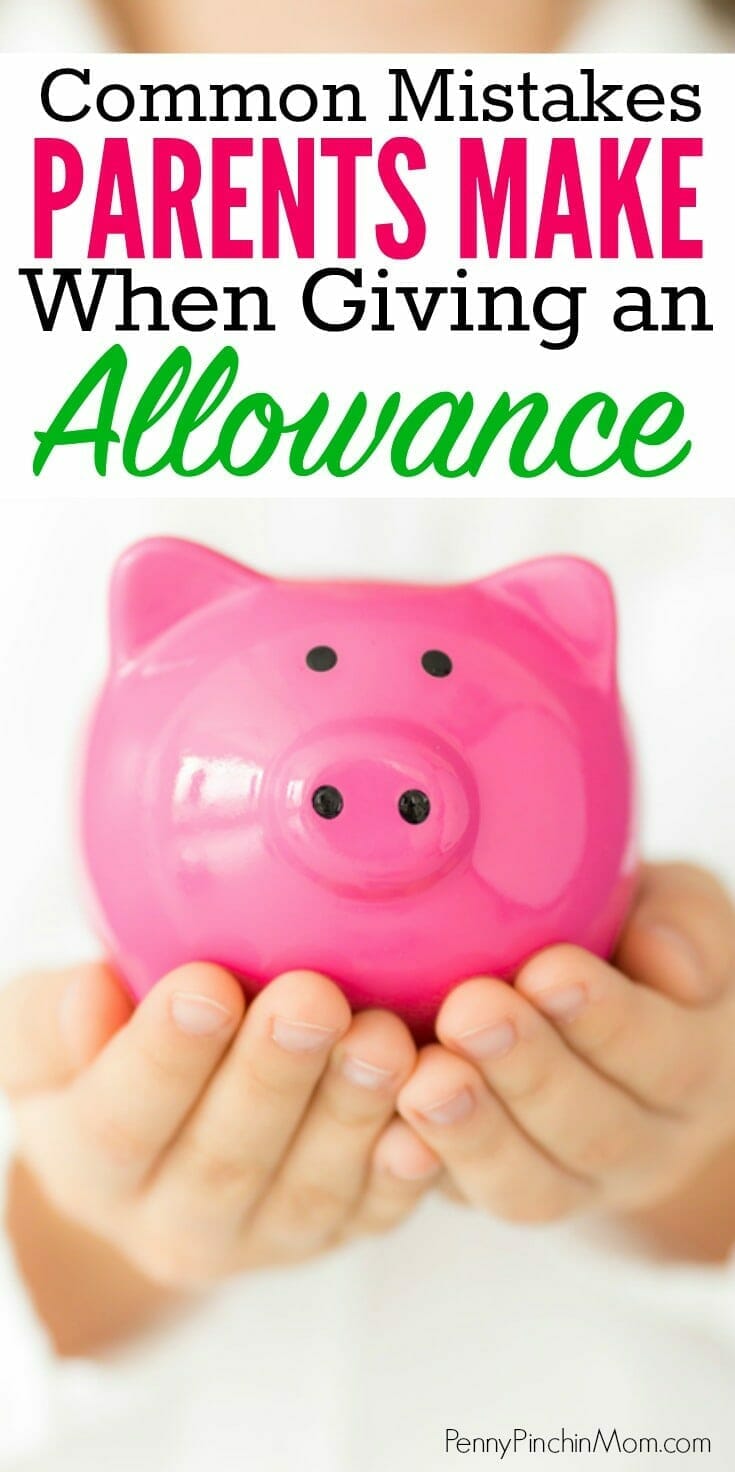If you give your kids an allowance, you might be going about it all wrong. Find out which mistakes you might be making and how much you should pay your kids.
According to Rooster Money, the average child between the ages of 4 – 14, earned $8.74 per week in 2017. That was a total of $450 over the course of a year. But, what did these kids do to earn this money?
Most parents give money to their children and call it an allowance. That is all fine and good, but many of them are making common allowance earning mistakes.
Are you guilty of any of these?
MISTAKES PARENTS MAKE WHEN GIVING AN ALLOWANCE
Not Educating Your Kids About Money
Handing over $20 to your son or daughter as allowance does not teach them anything about money. And, if you think they will learn about this in school, you’d be wrong.
Financial education falls upon parents. It is important that as your child begins earning money that he or she knows how to manage it. The lessons should include budgeting, self-restraint, savings and more.
When a child earns an allowance, he or she should understand the concept of a budget, saving and giving. Without these basic skills, they will not understand how finances work. Talking to your kids about money helps set them up for financial success as they grow and become adults.
Not Starting Soon Enough
As soon as your child understands the basic concept of money, he or she is old enough to begin earning an allowance. For most kids, this will be around age 5.
Kids need to know why we have money and learn to appreciate it. Starting them at a young age helps you teach them how to save and spend. The idea is to instill money values that will follow them through adulthood.
Attaching an Allowance to Chores
One of the most common mistakes parents make with an allowance is tying the money to the completion of regular household chores. That is not how it should work.
Kids need to do chores as a regular part of belonging to your family. There should not be money involved in exchange for getting them done. Instead, children earn an allowance when they complete tasks above and beyond standard household chores.
For example, they need to make their bed, do the dishes and take out the trash. Those are part of living under your roof. However, if your child rakes the leaves, does laundry or vacuums the house unprompted, those items warrant earning an allowance.
It is essential your child know which chores are required and things they can do to earn money. Using a chore chart is a simple way to visually teach them and help them track what they need to do.
Paying them too much
If you pay your child too much, it can leave them with a sense of entitlement. Rather than them learning how to save and budget, they have not worked hard to reach their own financial goals.
Being inconsistent
Just as an adult relies upon payday, so should your kids. Giving an allowance should be done consistently. If your child is not earning the allowance on a regular basis, they may end up confused with the way money works.
If you decide to pay weekly, then pay weekly. If it is monthly, stick to it. Whatever payment schedule you create, make sure you stick with it.
Not making them pay for things themselves
Kids should not earn an allowance and just get to use only for their wants. They must understand the concept of needs vs. wants. For example, they need to buy a birthday gift for their sister. However, they want to buy a book for themselves.
Don’t pay for things your kids do not need out of your budget. Instead, teach your child how to save to buy the things they want. Make sure they understand how events may come up that force us to use our savings on things we do not want.
Paying inconsistently between children
Kids remember everything. They know at what age their older brother was able to stay up until 9:00. They also recall when big sister got her first cell phone.
They’ll also remember how much you paid for an allowance. Trust me.
It is essential that the pay rate remains consistent not only at each age but for all children. Boy or girl, pay your children the same allowance at each age.
Not letting your kids make mistakes
We all make mistakes. That is part of being human. Kids should be allowed to as well.
The thing about mistakes is that it is how we learn. While they are often painful, mistakes remind us as to why we do not want to repeat them.
The first time your child doesn’t have enough money for a birthday party gift because he bought an expensive toy, he or she will remember. Having to pass on attending a party or giving something they do not want is a valuable lesson.
Not being the example
Children are sponges, and they take in all around them. They follow your lead.
If you mismanage your money and do not save and budget correctly, how do you expect for them to do the same? Be the example you want your kids to follow.
Not using a bank to teach them
Your child needs to understand how banking works. At a young age, it is just teaching them how to make savings deposits. Then, as they grow up, they need to understand more concepts, such as the difference between debit and credit.
Take your child to your bank and explain how it works. Show them how you can withdraw your money when it is needed and how to make a deposit. Children need to start learning banking basics as soon as they begin earning money.
Identifying the mistakes, you are making will help set you and your children up for financial success. But, you may still have one lingering question:
HOW MUCH ALLOWANCE SHOULD I PAY MY KIDS?
Most parents wonder this same thing. They aren’t sure what to pay. After all, as we discussed above, they do not want to give their child too much. But, they don’t want to not pay them enough either.
The amount you pay will vary based on their age. The amount a four-year-old will earn is obviously much lower than what you would pay your thirteen-year-old.
But, what is the going rate?
A good rule of thumb when paying an allowance is $1 per age per week.
A four-year-old will earn just $4 whereas the thirteen-year-old will receive $13. As kids get older, their responsibilities grow with them. They are required to do more, to earn more. They have to find more additional things to do around the house, it makes sense they be paid accordingly. Remember, you don’t want to pay them for doing the things you expect. If they do those additional chores, then they earn thier allowance.
Now, if $1 a week is a bit more than you can afford, adjust it. You can pay $0.50 per age or even a flat rate of $8 a week. The great thing about an allowance is that you can adapt it to make it work for your family.

